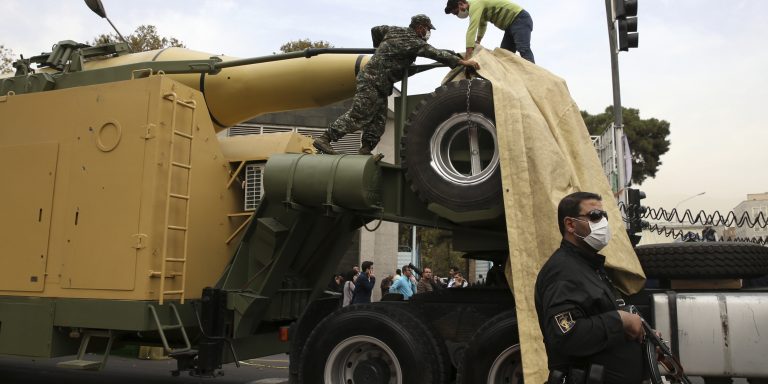INTELBRIEF
November 21, 2017
TSC IntelBrief: Limiting Iran’s Missile Programs

• Iran is pledging to voluntarily restrain its ballistic missile development in hopes of defusing U.S.-led pressure for mandatory curbs and additional sanctions.
• Iranian leaders are concerned advancing their missile program will justify Trump administration threats to withdraw from the 2015 multilateral nuclear agreement.
• U.S. allies in Europe are divided over how extensively, if at all, to pressure Iran into new talks to limit its long range ballistic missile development.
• Iran will continue supplying shorter range missiles to regional allies to pressure regional adversaries Saudi Arabia and Israel.
In his October 13 speech outlining Washington’s policy toward Iran, President Donald Trump threatened to withdraw the United States from the landmark 2015 nuclear agreement with Tehran, unless Congress and U.S. allies succeed in closing what the U.S. claims are key loopholes in the accord. Foremost among those loopholes were the agreement’s failure to impose binding limits on Iran’s ballistic missile program and Tehran’s supplying missiles and other weaponry to regional armed factions. U.N. Security Council Resolution 2231, which enshrined the accord, contained only a voluntary restraint on Iran’s missile program. It superseded a previous Resolution that had mandated such limits, though even then Iran routinely ignored the binding requirements by conducting at least five major ballistic missile tests each year.
Despite these resolutions and U.S. and European anti-proliferation sanctions, Iran has been able to develop what U.S. intelligence officials call the largest ballistic missile program in the Middle East. The latest congressionally-mandated Defense Department annual report on Iran’s military power states that ‘Iran maintains a substantial inventory of missiles capable of reaching targets throughout the region, including U.S. military bases and Israel, and the regime continues to develop more sophisticated missiles.’ Among Iran’s latest achievements was the successful July launch of its Simorgh space launch vehicle, which U.S. officials said could advance Tehran's efforts to develop an Intercontinental Ballistic Missile (ICBM) with a range of over 3,000 miles.
Washington’s European allies are divided on how to respond to the Trump administration’s threats to withdraw from the accord with Iran, despite a broad European pledge to work with the United States to limit Iran’s missile program. French President Emmanuel Macron appeared to support the U.S. position when he said in Dubai, on November 9 that ‘There are negotiations we need to start on Iran’s ballistic missiles.’ However, European Union (EU) foreign policy chief Federica Mogherini later insisted that the nuclear accord could not be renegotiated and rebuffed Macron’s additional suggestion that the EU consider imposing additional sanctions against Iran’s missile program.
Iranian leaders have sought to exploit Western divisions to avoid justifying a Trump administration withdrawal from the accord, a fresh round of sanctions, and new pressure to enter into missile negotiations. In late October, Iran offered what appeared to be a key unilateral concession intended to satisfy U.S. and French demands. The head of Iran’s Islamic Revolutionary Guard Corps (IRGC) stated that Supreme Leader Ayatollah Ali Khamenei had determined the current maximum range of Iran’s missiles (about 1,200 miles) is ‘sufficient for now’ to reach ‘most of American interests and forces’ in the region. The statement implied that Iran would voluntarily refrain from developing a missile of ICBM range – a limitation that was certain to form the core of Western demands in any new missile talks with Tehran. This concession apparently enabled Iranian leaders to formally reject Macron’s call for new missile negotiations, despite hinting at the time of President Trump’s October 13 policy statement that they might entertain such talks.
Iran’s self-declared voluntary restraint on its most advanced ballistic missile program is unlikely to satisfy the Trump administration, insofar as Iran has made no promises to stop transferring ballistic missiles to its regional allies and proxies. U.S. officials backed Saudi assertions that missiles fired by Yemen’s Houthi rebels into the Kingdom in July and again in November – the latter of which was intercepted by U.S.-supplied missile defenses - were provided to the Houthis by Iran. U.S. Ambassador to the United Nations Nikki Haley told the United Nations Security Council on November 7 that the Houthi missiles were definitely of Iranian origin, including an Iran-made Qiam missile with an estimated range of 500 miles. According to Haley, the missiles fired by the Houthis ‘had not been present in Yemen before the conflict.’ A White House statement ‘welcome[d] the Kingdom of Saudi Arabia’s statement exposing the Iranian regime’s support for Houthi militias, including the supply of illegal arms such as ballistic missiles.’ The U.S. and Saudi allegations came two months after Israel’s Prime Minister Benjamin Netanyahu told the UN that Iran is building factories in Syria and Lebanon to supply Tehran’s most reliable regional proxy, Lebanese Hizbollah, with precision-guided missiles as part of what Netanyahu asserted is Iran’s goal ‘to eradicate Israel.’ Even if Iran were to freeze its long-range missile program, Tehran’s continued supply of missiles to regional armed factions ensures the Trump administration will press for additional multilateral missile-related sanctions and negotiations to institute mandatory curbs on all Iranian missile programs. Whether the administration obtains the required support from its European allies for that pressure to be effective, remains an open question.
For tailored research and analysis, please contact: info@thesoufancenter.org
.
.